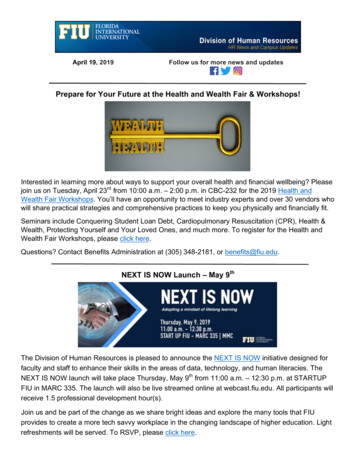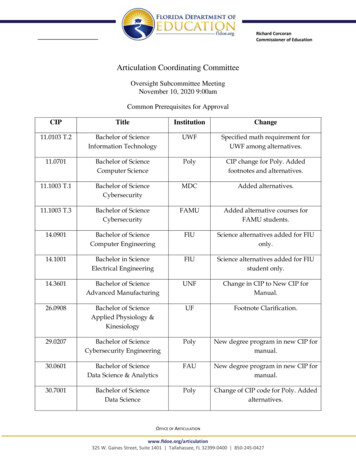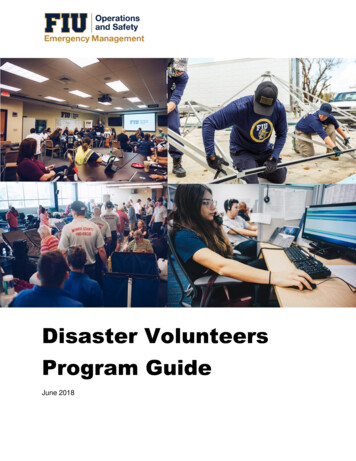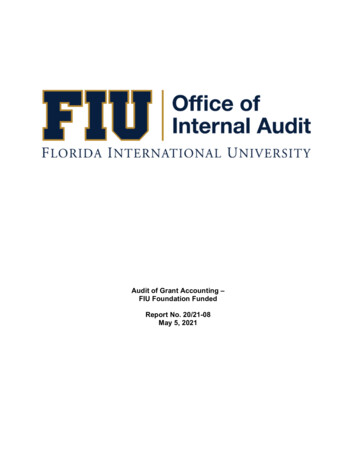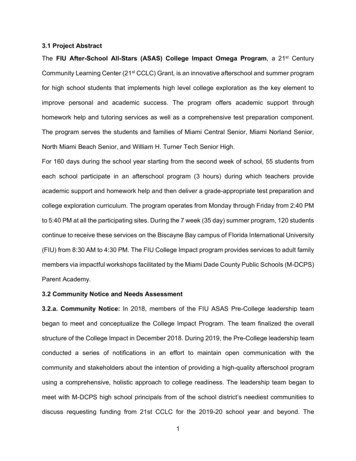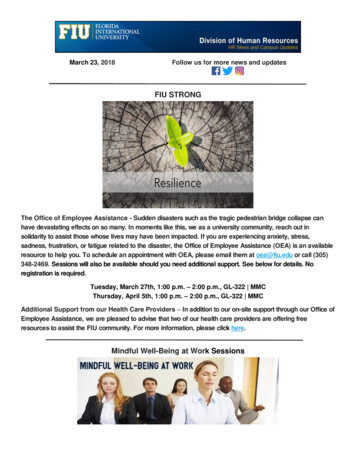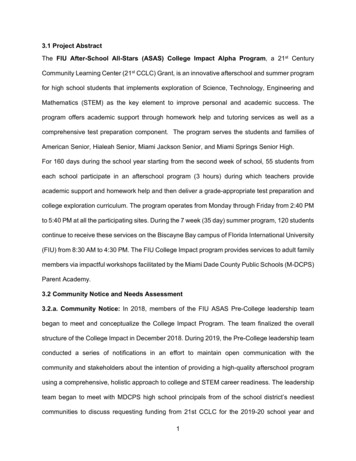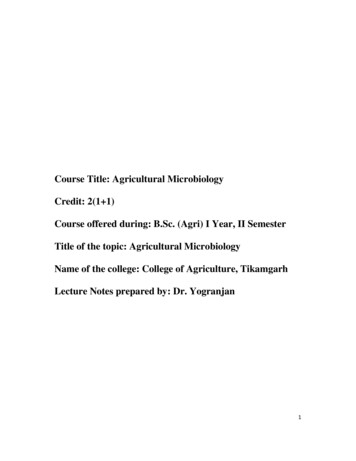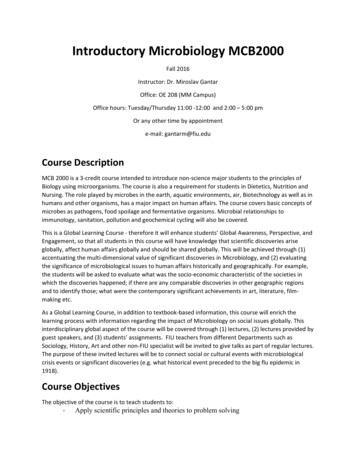
Transcription
Introductory Microbiology MCB2000Fall 2016Instructor: Dr. Miroslav GantarOffice: OE 208 (MM Campus)Office hours: Tuesday/Thursday 11:00 ‐12:00 and 2:00 – 5:00 pmOr any other time by appointmente‐mail: gantarm@fiu.eduCourse DescriptionMCB 2000 is a 3‐credit course intended to introduce non‐science major students to the principles ofBiology using microorganisms. The course is also a requirement for students in Dietetics, Nutrition andNursing. The role played by microbes in the earth, aquatic environments, air, Biotechnology as well as inhumans and other organisms, has a major impact on human affairs. The course covers basic concepts ofmicrobes as pathogens, food spoilage and fermentative organisms. Microbial relationships toimmunology, sanitation, pollution and geochemical cycling will also be covered.This is a Global Learning Course ‐ therefore it will enhance students’ Global Awareness, Perspective, andEngagement, so that all students in this course will have knowledge that scientific discoveries ariseglobally, affect human affairs globally and should be shared globally. This will be achieved through (1)accentuating the multi‐dimensional value of significant discoveries in Microbiology, and (2) evaluatingthe significance of microbiological issues to human affairs historically and geographically. For example,the students will be asked to evaluate what was the socio‐economic characteristic of the societies inwhich the discoveries happened; if there are any comparable discoveries in other geographic regionsand to identify those; what were the contemporary significant achievements in art, literature, film‐making etc.As a Global Learning Course, in addition to textbook‐based information, this course will enrich thelearning process with information regarding the impact of Microbiology on social issues globally. Thisinterdisciplinary global aspect of the course will be covered through (1) lectures, (2) lectures provided byguest speakers, and (3) students’ assignments. FIU teachers from different Departments such asSociology, History, Art and other non‐FIU specialist will be invited to give talks as part of regular lectures.The purpose of these invited lectures will be to connect social or cultural events with microbiologicalcrisis events or significant discoveries (e.g. what historical event preceded to the big flu epidemic in1918).Course ObjectivesThe objective of the course is to teach students to:‐Apply scientific principles and theories to problem solving
‐‐‐‐‐Scientifically evaluate situations in which microorganisms play role (relationshipbetween microorganisms and diseases, food spoilage, production of drugs etc.)Distinguish between “good and bad microbes”Understand the basic microbiological techniques (concept of asepticwork, cultivation and identification of microorganism)Use scientific theories to test microbiological hypothesisAssess and critically evaluate claims made in popular media for their scientific merit.Global Learning Course ‐ Specific ObjectivesGlobal Awareness ‐ Students will be able to show awareness of the global interrelationship betweenhuman affairs on one side and disease causing microorganisms, Biotechnology, and Environment issueson the other side. More specifically it will include:‐‐‐‐‐Understanding of the scientific concepts that underlies the global nature of diseasescaused by microorganismsDeveloping critical thinking based on new global scientific information obtained inclassUnderstanding the impact of discoveries in Microbiology on global human affairs(novel cures, bioterrorism )Understanding the interrelationship between microbiological diseases andsocial/economic factorsNavigating through time - connecting/associating discoveries in Microbiology withthe achievements in Arts and HumanitiesThe assessment for Global Awareness will be in the form of (1) embedded test questions and (2)assignments.Global Perspective ‐ Students will be able to analyze health and economic issues related tomicrobiological situations that occur globally. The global industrial and agricultural use of microbes andtheir effect on social interaction will be analyzed with respect to global economies and pollution. Thiswill include:‐‐Comprehension of why microorganisms have a global impact on human affairsAnalyze why socio-economic factors may be responsible for outbreaks of diseases(Example: Outbreak of Cholera in post disaster Haiti)The assessment for Global Perspective will be in the form of (1) embedded test questions and (2)assignments.Global Engagement ‐ Students will demonstrate a willingness to engage in diseaseprevention/intervention to address individual or global health problems, and other microbiologicalsituations. This will include the development of the following abilities:‐‐To analyze students’ own willingness to be involved in problem remediationregarding microbiological situationsTo present their own plan for potential abatement of crisis situations caused bymicrobiological issuesThe assessment for Global Engagement will be accomplished by grading the papers to be submitted bystudents.Interdisciplinary content ‐ Invited lectures
Interdisciplinary content of the course will be covered through invited lectures to be provided by FIUfaculty from different Departments as well as by other specialist (e.g. representatives from CountyHealth Department, Health care institutions, etc.). These lectures will be embedded in regular lecturesfor the purpose of interconnecting microbiology‐caused events and some social or culturaldevelopments. One example:Chiropractic practice – can it improve the function of the immune system?These lectures will be organized on contingency bases and will depend on the availability of the speakersand they might vary between semesters.Common reading for Global Learning:Appiah, K.A., “The Case for Contamination,” New York Times, January 1, 2006. Online mopolitan.html? r 1&pagewanted printWhy this course belongs to Global Learning InitiativeMicrobes are global. No other organisms affect human lives as microbes do. They can be found in anyenvironment. Their global significance can be found in the facts that they sustain life on planet Earththrough the recycling of elements, by providing food (through fermentation), by maintaining health(probiotic activity), and by causing diseases (pathogenic microorganisms). They are not restricted bytime or social/political system. In others words, microbes are truly global.PrerequisitesNoneRequired TextCowan, 2012 (3rd edition), MICROBIOLOGY ‐ A Systems Approach, McGraw Hill Higher EducationorCowan and Talaro, 2009 (2nd edition), MICROBIOLOGY ‐ A Systems Approach, McGraw Hill HigherEducationThe text can be purchased:‐ at the FIU bookstore‐ as an E‐BOOK for a much lower price from the publisher http://www.coursesmart.com/‐ from abebooks.com for discounted versions of new and used books,‐ from amazon.co.uk and others or international editions. The international editions arepaperback and about half the cost, give them a week to send from the UK.i‐clickerYou will be required to have an i‐clicker. You can either buy it or rent it from the FIU Bookstore. Afterobtaining the i‐clicker you will need to register your device http://www1.iclicker.com/register‐clicker/ byusing your Panther ID #.Assignments:The active learning strategy includes the following components:
‐ Required:‐ Writing an essay‐ Global Learning Questions‐ Optional: A Power Point presentation – extra credit (see below)Writing an essay. You can chose to write a paper (3‐5 pages, double space, font 12) on amicrobiology topic of your choice. It has to cover microbiological aspect as well as an aspect of theglobal perspective.Examples of essay titles:‐ Tuberculosis – a social aspect of a disease‐ Is globalization preventing or contributing to spread of AIDS‐ Microbial water contamination in beaches of South Florida‐ HIV in Miami‐Dade County‐ Dengue Fever: how does it affect underdeveloped countries?The essay should provide basic information on the medical and microbiological aspects of the disease(causative agent, symptoms, treatment, etc.) as well as the social aspect (e.g. socio‐economiccharacteristics of those suffering from this disease, geographic distribution; historic perspective, etc). Apaper should present the perspective/position of different nations/countries in regard to measures forpreventing disease outbreaks (e.g. type of health care system, vaccination programs etc.) and comparethose to WHO standards.Please request an approval of the title of your paper by sending an e‐mail to Dr. Prabhakar Pant (TA)ppant002@fiu.edu and submit the paper as a Word document to the same e‐mail address.Global Learning Questions ‐ Will be provided during each class. You will have to look for thecorrect answer (not to be found in the text book). The same questions will appear on the exam. Eachexam will contain 10% of Global Learning questions.Power Point presentation. The topic of the presentation should have a global perspective and itshould cover new or controversial information of a microbiology problem. If you decide to give a PPpresentation, then you will not have to write an essay. In addition, you will earn between 1‐5% points asextra credit. For an example of the topic, please see above (same as writing an essay). If there are moreregistered students for presentation than available spots, then your teacher will select presentationsthat are the most relevant for this Global Learning course. Students’ presentation will be given duringthe regular classes. (see the course calendar).To get an approval for the title of oral presentation please send an e‐mail to gantarm@fiu.edu. Oncethe title is approved, you can start working on your presentation. You are expected to send your PP toyour teacher one week ahead of time, so that all necessary corrections can be done in timely manner.Before you start writing an essay or preparing an oral presentationThe topic and the title of the essay/field work/oral presentation need to be approved beforehand byyour teacher (check the due date in the Course Calendar).For the title approval for the paper send an e‐mail to Dr. Prabhakar Pant (TA) ppant002@fiu.eduFor the title approval for oral presentation send an e‐mail to gantarm@fiu.eduThe essay and presentations will be graded based on a rubric that will evaluate: Scientific and Globalaspect of the selected topic.
AttendanceNo attendance will be taken. However, participation (i‐clicker) will be rewarded. You can earnthree extra points if you have less than 3 absences.GradingYour final letter grade will be based on:(1) The average score of three exams (worth 70% of your grade) and on(2) The score obtained for the paper on Global‐Interdisciplinary aspect of the course (worth 30%of your grade). In addition, you can choose to accomplish additional assignment for extracredit (see below).(3) Extra credits earned – see belowThe letter grade will be given after the 3rd exam and will be based on a class curve. If a regulargrade distribution occurs, the standard grading scale (90%‐100% A, 80%‐89% B, 70%‐79% C, 60%‐69% D, 60% F) will be used. If the average score of the whole class is below 75%, then the curvingwill be applied.ExamsThere will be 3 exams over the course of the semester ‐ each consisting of 50 multiple choice questionsand each worth 100% course points. Each exam will have 10% questions covering the global aspect ofthe course. Exam #3, though scheduled during the week of finals, will not be cumulative.Exams will be multiple‐choice with sense‐mark (Scantron) answer sheets.You will be required to bring #2 pencils with at least one eraser. Laptops, palm pilots, cell phones orother electronic devices ARE NOT ALLOWED during the EXAM. You will be required to bring your FIUstudent ID to every exam. Wearing brimmed hats or baseball caps during exams is not permitted.Extra points can be earned by:(1) Participating in sessions with the PLTL program (Peer Led Team Learning). By activelyparticipating in PLTL you will gain extra points that will increase your final grade by up to 5%points. Please reference the PLTL Syllabus (http://pltl.fiu.edu/ ). Why should you use theirservices? Each week you will be meeting with a PLTL leader and a small group of students. APLTL Leader is a peer who has taken the course before and will guide you through theworksheets each week. This will definitely help you score higher on the exams. Learn how to getthose extra points by contacting the PLTL team.(2) Giving a 10-minute Power Point presentation. Please see above.Make‐up Exam
If you are unable to attend an exam, contact the instructor at least 48 hours prior to the scheduled examtime to discuss alternatives. Missed exams may result in a score of zero if the instructor is not notified ina timely fashion. Alternatives to a score of zero for the exam may be discussed with the instructor.Make‐Up Exams will be given only to students providing valid documentation of a medical or otherserious problem. Make‐Up exams are not based on multiple choice questions; they will be in the form ofessay questions.Academic conductFlorida International University is a community dedicated to generating and imparting knowledgethrough excellent teaching and research, the rigorous and respectful exchange of ideas, and communityservice. All students should respect the right of others to have an equitable opportunity to learn and tohonestly demonstrate the quality of their learning. Therefore, all students are expected to adhere to astandard of academic conduct, which demonstrates respect for themselves, their fellow students, andthe educational mission of the University. All students are deemed by the University to understand thatif they are found responsible for academic misconduct, they will be subject to the Academic Misconductprocedures and sanctions, as outlined in the Student Handbook.CheatingCheating will not be tolerated! Students caught cheating during an examination will be removed fromthe exam and given an "F" for the course.Plagiarism is academic misconduct that involves using words, opinions, and information of others asyour own. Written work will be analyzed in "turnitin.com" and any document identified as plagiarismwill generate an “F” and charges for “Academic Misconduct” against the student will be brought up.Academic Misconduct becomes a permanent part of a student record.Incomplete GradesAn incomplete grade is a temporary symbol given at the discretion of the instructor for work notcompleted, because of serious interruption not caused by the student's own negligence. An incompletegrade must be made up as quickly as possible, but no later than two semesters or it will automaticallydefault to the grade that the student earned in the course. There is no extension to the two semesterdeadline. The student must not register again for the course to make up the incomplete. Incompletegrade will require written documentation (doctor's note, accident report, etc.) of the underlyingcondition that impedes student progress. A form will need to be signed by the student detailing theprocedure and agenda for completing course‐work. Students who receive an incomplete grade and haveapplied for graduation at the end of that term, must complete the incomplete grade by the end of thefourth week of the following term. Failure to do so will result in a cancellation of graduation. Thatstudent will need to reapply for graduation.Pre‐Nursing StudentsNote of Advice
MCB2000 and Lab are required along with other science courses for entry into BSN in the School ofNursing. This course will cover the basics of biological sciences as well as the basic nature of microbialdiseases, immunology and epidemiology. This course is not simply a requirement, but rather one thatcan provide the fundamental scientific background to Nursing.Please note that the admission requirements to FIU's Nursing program do not allow repeats in sciencecourses. That means you must earn at a minimum a grade of C (not C‐ or lower). Nursing program is verycompetitive and a grade of C does not guarantee that you will get in.Course CalendarDateAug. 232530Sept 1IntroductionWhy is Microbiology importantChemistry of MicrobiologyTools in MicrobiologyChapters11236Cell structure - Prokaryotic cell48131520222729Oct. 461113Cell structure - Eukaryotic cellVirusesMicrobial Nutrition and GrowthMicrobial MetabolismEXAM IMicrobial GeneticsGenetic EngineeringControl of MicrobesDrugs and MicrobesMicrobe-Human InteractionsNon-Specific Defense567891011121314Student presentationSpecific Immunity15Student presentationSubmit a paperDisorders in ImmunityDiagnosing InfectionsEXAM IIDiseases of Skin and Eyes1617Student presentation18Students’ presentations3Diseases of the Nervous System19Students’ presentations8Veterans Day Holiday18202527Nov. 1TopicsActivityStart submitting a topicfor a paper orpresentation for approvalStudent presentationStudent presentationStudent presentationStudent presentationStudent presentationStudent presentationGuest speaker - TBAStudent presentationStudent presentation
1015172224Dec. 16Diseases of the Cardiovascularand Lymphatic SystemDiseases of the RespiratorySystemDiseases of the GastrointestinalSystemDiseases of the GenitourinarySystem20212223FINAL EXAMStudents’ presentationsStudents’ presentationsStudents’ presentationsStudents’ presentationsThanksgiving HolidayEnvironmental MicrobiologyStudents’ presentations24Students’ presentations
For the title approval for the paper send an e‐mail to Dr. Prabhakar Pant (TA) ppant002@fiu.edu For the title approval for oral presentation send an e‐mail to gantarm@fiu.edu The essay and presentations will be graded based on a rubric that will evaluate: Scientific and Global
